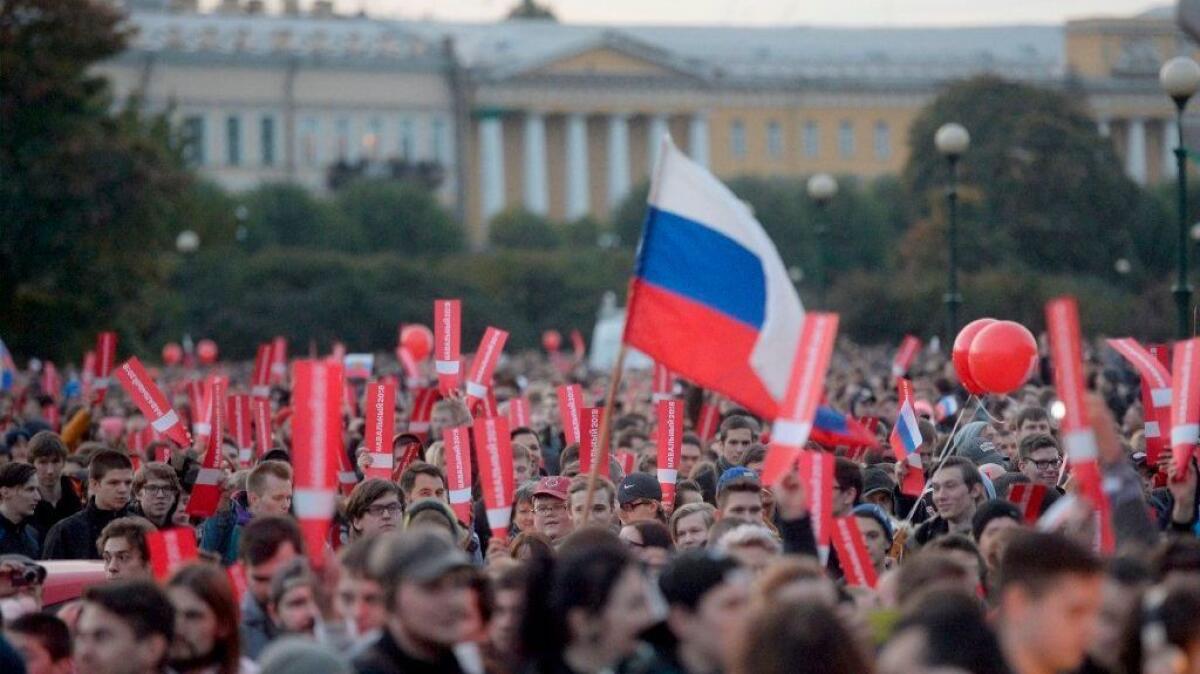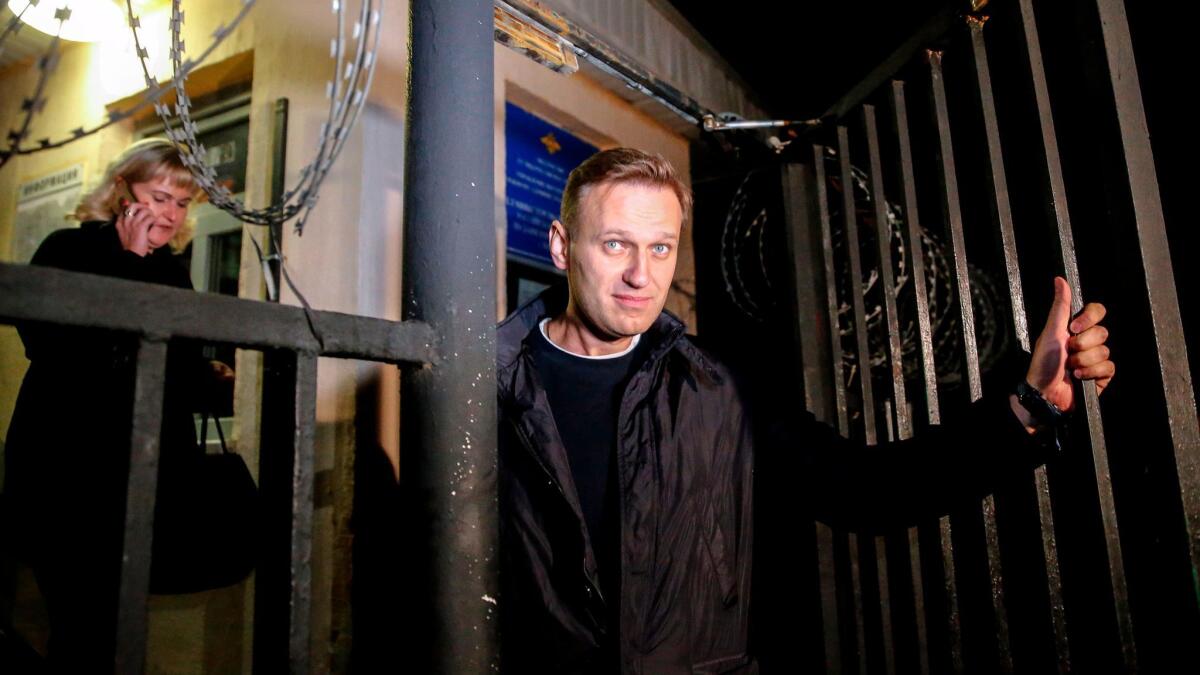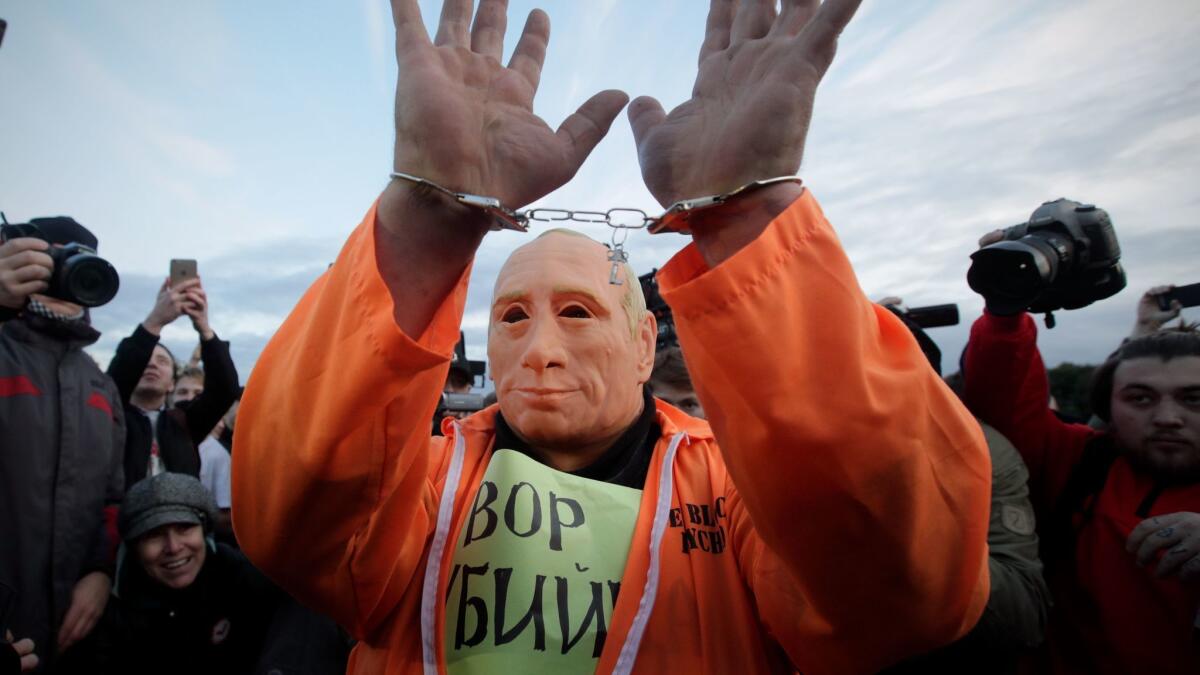On Putin’s 65th birthday, thousands of protesters gather across Russia in support of opposition leader

- Share via
Reporting from Moscow — Thousands of supporters of Russian opposition leader Alexei Navalny demonstrated in 80 cities across the country Saturday in response to calls from the anti-corruption crusader to petition for his release from jail and to allow him to register as a candidate against President Vladimir Putin in next year’s election.
The protests were the third such anti-corruption, anti-government demonstrations organized this year by the fierce Putin critic. But unlike the previous rallies, Saturday’s protests saw significantly fewer participants and fewer arrests than were recorded in March and June.
In 25 cities across the country, there were about 271 detentions reported, according to OVD-Info, an independent watchdog group that monitors police detentions. Previous demonstrations on March 26 and June 12 saw more than 1,800 detentions at each event, including the arrest of Navalny himself on both dates.
Saturday’s demonstrators came out in response to Navalny’s video message this week calling for supporters to pressure the Kremlin to allow for free and open elections. Navalny, 41, has been holding election campaigns across the country, despite the fact that Russia’s election committee has declared him ineligible because of a 2013 criminal conviction. He has dismissed the conviction as politically motivated.

Navalny was detained on Sept. 29 as he exited his Moscow apartment building on his way to catch a train to a campaign rally in Nizhny Novgorod, the city formerly known as Gorky, almost 250 miles east of Moscow. A Moscow judge sentenced Navalny to 20 days in jail on Monday for repeated violations of laws against organizing unsanctioned demonstrations.
Several of Navalny’s campaign staff in Moscow and other cities were detained ahead of Saturday’s rally. His campaign headquarters in Moscow was raided by police on Friday. His campaign manager, Leonid Volkov, was sentenced to 20 days in jail. He was released briefly on Friday before being arrested again.
Saturday’s protest was originally scheduled as a Navalny campaign rally in St. Petersburg, although city officials refused to sanction the event. But after Navalny was sentenced to another jail term earlier this week, he appealed to his followers in a video message posted on his popular YouTube channel to protest against his imprisonment across the country.
Oct. 7 is also Putin’s 65th birthday, and Navalny said it would be a “birthday present” for the Kremlin leader.
Putin has been in power as president or prime minister since 1999. He has not yet confirmed that he will seek reelection, but there is little doubt that he will run. The election is in March.
With approval ratings hovering above 80%, Putin is unlikely to face serious competition if and when he declares another run for office.
Navalny has gained popularity in recent months, although mainly with a new, younger generation of followers who are dedicated to his YouTube channel’s straight-forward messages about what Navalny describes as government-supported corruption. State television does not cover Navalny-related stories, and his name recognition around the country remains low.
“Let Putin go on a well deserved pension already,” Navalny wrote in a Facebook post on Wednesday from his Moscow cell. “He has been in power for 18 years, that’s enough.”
The Kremlin tightly controls the political process in Russia by allowing only a handful of opposition candidates to register in elections. In the past, those candidates have included leader of Russia’s Communist Party Gennady Zyuganov and firebrand nationalist Vladimir Zhirinovsky.
In 2013, Navalny challenged a Kremlin-backed mayoral candidate in Moscow and received 30% of the vote. Some say this surprised the Kremlin, which has since tried to prevent Navalny’s popularity from spreading, through media blackouts of his activities.
In St. Petersburg, the demonstration turned out to be the day’s largest with more than 2,000 protesters marching down the street of the president’s hometown, chanting, “Happy birthday” and “Putin, go on pension!” In Moscow, many protesters refrained from carrying political signs and placards. In St. Petersburg, waves of demonstrators waved Navalny 2018 campaign placards.

The demonstration started with thousands of people gathered in the historic Field of Mars Park in Saint Petersburg, just blocks from the Hermitage Museum and Winter Palace. The crowd then marched along the picturesque Liteyny Prospect, where more people joined. Within an hour of its start, the demonstration was blocked by several columns of riot police and buses. Dozens were detained and taken away in police buses, the first and harshest mass arrest of the day.
In Moscow, police told Russian news agencies that about 700 demonstrators had participated in a rally that started on Pushkin Square, a central square at the top of the capital city’s main drag, Tverskaya Street. Under the shadow of Alexander Pushkin, Russia’s beloved poet, the crowd of mostly younger demonstrators chanted, “Russia without Putin” and “We are the power here” and “Free Navalny.”
After about an hour on the square, the crowd moved down Tverskaya toward Red Square, despite bursts of sometimes heavy rain. A column of police blocked the demonstrators’ entry to the square, and the crowd returned to Pushkin Square.
Many protesters carried Russian flags, which Navalny has encouraged followers of his popular YouTube channel to do as a way of showing their support for a strong but free Russia.
Other demonstrators carried rubber ducks or balloons shaped like yellow, rubber ducks. The ducks have become a symbol of the Navalny-inspired protest movement after his Anti-corruption Foundation published a video alleging that Prime Minister Dmitry Medvedev through corruption schemes has amassed lavish mansions complete with a dedicated duck house.
“We are here because we don’t want Putin in power anymore, and we support Navalny as president,” said Artyom Telunts, 18, a university student in Moscow. “We want a free Russia, with free press, free elections, free internet. Freedom in general. Putin needs to go.”
The fact that Navalny has chosen Putin’s 65th birthday to protest is particularly irritating to the Kremlin, said Alexander Baunov, a senior fellow at the Carnegie Moscow Center, a think tank.
Navalny wants to show that Putin, after nearly 18 years in office, is closer to the age when his predecessor, Boris Yeltsin, left the presidency and appointed Putin to replace him, and past the age when Russian men can start to collect their pension, which is 60.
“Putin has been well received for many reasons, but one of the important reasons is that he was shown as in a good physical form and a strong man,” Baunov said. “Now at 65, he doesn’t like society to be reminded that he was the same age as Yeltsin, and this is what Navalny is doing.”
Indeed, young followers of Navalny frequently comment about Putin’s having maximized his time in office.
“It’s time for him to go on pension,” said Dasha Schastnaya, 16, who was waving a duck balloon on Moscow’s Pushkin Square as a light rain fell. “We need someone new and fresh who doesn’t just want power. Someone who wants to do something for our country to make us perfect.”
Twitter: @sabraayres
Ayres is a special correspondent.
ALSO
A movie about a czar’s love affair ignites violent protest from Russia’s religious right
The enemies are fake, but Russia’s war games are real. So is the alarm.
More to Read
Sign up for Essential California
The most important California stories and recommendations in your inbox every morning.
You may occasionally receive promotional content from the Los Angeles Times.














